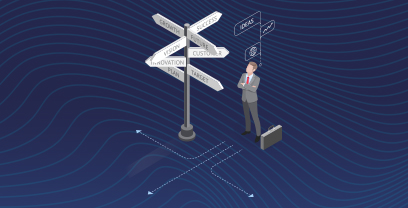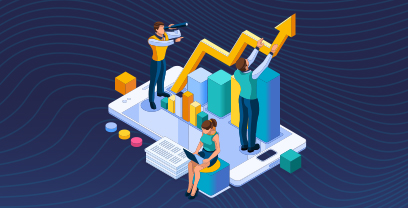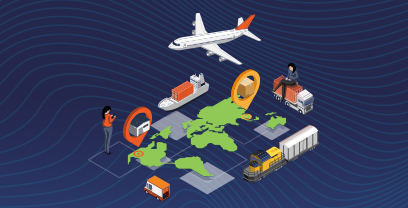Blog »
4 Ways Modern Software will Empower Digital Procurement

by Alex Saric
The past few years have been a boon for procurement, which has become increasingly strategic and critical to business. The pandemic has accelerated this trend, with the Procurement function front and center in the fight to ensure supply chain resilience and continuity, reduce costs and protect the bottom line. To maintain its upward trajectory, procurement must now show that it remains relevant as corporate priorities shift to restoring growth.
In a recent webinar, Ivalua’s CMO Alex Saric and Forrester’s Vice President and Principal Analyst Duncan Jones revealed the findings from a new Forrester survey on how Procurement can help restore growth and ensure business resilience.
According to Jones, companies’ key priorities are shifting away from cost-cutting to focus primarily on improving customer experience. “The Procurement function needs to move its focus from its traditional emphasis on cost to the things that really matter to customers,” he said. These include faster co-innovation with suppliers, working with sustainable and ethical suppliers and empowering employees — all of which will lead to increased business agility.
Meanwhile, organizations face myriad external risks: climate disruption, geopolitical issues, increasingly strict legislation and regulations, and, of course, the global pandemic all impact the supply chain, and Procurement is under heightened pressure to mitigate those macro risks with effective sourcing and supplier management processes. As a result, there has been unprecedented growth in the software category of Supplier Value Management (SVM), which helps free capacity via automation, improve collaboration and enable more informed decision-making.
SVM Is a $12 million Category
Forrester’s study of 500 Procurement Professionals looked into the opportunities for SVM software to help return business to sustained growth. According to Jones, there four key areas in which modern software will enable and empower procurement:
1) Optimize automation. According to Jones, the most interesting examples of automation are the tasks performed by rare and inexpensive sourcing and procurement professionals. “The early waves of automation involved automating the really simple unskilled tasks,” he said. “But there’s only so much value to gain by automating tasks for the lowest-cost employees. There’s a much bigger dividend to obtain by automating the most boring, mundane tasks of your top sourcing professionals.”
For example, allocating to the right GL codes for an invoice takes experience and knowledge — and it’s a task that can’t be given to an entry-level clerk. “These are tasks that skilled procurement professionals have to do, but are tedious and time-consuming,” Jones said, adding that trend toward automating more challenging tasks is resulting in higher employee satisfaction by lightening the workload and enabling them to apply their higher-level skill set to benefit the business. “You can get more business value by taking that workload away from those professionals so they can focus on higher-level tasks, such as contract negotiation or risk assessments.”
2) Shift from drilling down to alerting up. According to Jones, procurement software has traditionally focused on aggregating data and looking back at what already happened in order to prepare for what could happen in the future, which isn’t always useful. Smart software shifts from drilling down on existing data to alerting up, so managers can respond to events or trends in real time.
“Take, for example, delivery schedules,” Jones said. “Alerting up enables you to look at environmental factors such as traffic or weather, and identify that a delivery is likely to be late. That way you can take steps to mitigate the delay and line up alternative sources of supply.” Other examples include excessive price variances, duplicate invoices or superfluous approvals. Training the software to recognize potential risk or mistakes and alert up to procurement staff enables a more proactive approach to managing the supply chain and ensuring business continuity.
3) Optimize Decision-Making. According to Jones, the original vision for AI in sourcing and procurement was that it would tell procurement what they needed when, automatically contact the sellers for pricing and award the contract without human involvement. While that’s further away, Jones says AI-powered software is valuable for bringing multiple data sources in one place to present them to the user. “We no longer have to worry about integrating multiple extract and load interfaces together and cramming all of the data into one database,” he said. “Data can exist in different places in an SVM solution, and we can bring it together for analysis when it’s time for the user to make a decision.”
For example, today’s software can make recommendations based on past user or supplier behavior. Still, Jones cautions that this isn’t a reliable use of AI. “This type of prediction relies on learning from the people involved,” he said. “ If the risk assessor is biased or consistently mistaken in the way he interprets the answers, the software is going to replicate that. Or, if the humans using the software aren’t following any patterns of behavior, then the system will have difficulty making accurate predictions.”
Jones said that in the future, software will be able to identify bias and suggest better options, and the challenge is finding an objective way to measure the success or failure of previous decisions. It is important for organizations to ensure a solid data foundation now to capitalize on improving AI capabilities.
4) Improve Collaboration. A common trend throughout the survey results was the importance of supplier collaboration, and the challenges involved. Collaboration drives faster product innovation, and Forrester’s survey found that 44% of respondents collaborate with suppliers to launch new products and services. Software can support effective collaboration by enabling scalable, efficient interactions among procurement, business stakeholder and suppliers. It can help securely share information, make communication more efficient and improve project management.
Using technology not just for collaboration but to improve transactional processes is critical. For instance, software can facilitate faster payments and transparency, enabling more satisfying supplier relations that foster engagement and loyalty. “If you want to become the customer of choice for your supplier and get great innovation from them, paying on time is one of the best things you can do,” said Jones. “There’s a tangible link between paying faster and providing visibility into the payment process and suppliers’ willingness to co-innovate with a business — and the right software can make that happen.”
The Future of Procurement is Digital
Jones finished up with some helpful recommendations for procurement teams about how to best leverage software as they embrace the digital transformation needed to ensure business continuity, no matter what the future holds:
- Align procurement goals with business growth drivers such as innovation and agility
- Modernize your SVM software to deliver on these goals and help your supplier ecosystems be agile, ethical and reliable
- Find software vendors with AI-powered capabilities both in their current offerings and in their product roadmap
- Focus first on automating semi-skilled tasks and implement prescriptive alerts to enable proactive supplier management
Ivalua is helping companies worldwide digitize and automate procurement processes, collaborate and co-innovate with suppliers, improve access to actionable insights and ensure business continuity in the Covid-19 era. To learn more about how Ivalua can support your organization with its digital transformation initiatives at any stage along your journey, contact us today. You can also download the report here.

Alex Saric
Chief Marketing Officer
Alex has spent over 15 years of his career evangelizing Spend Management, shaping its evolution and working closely with hundreds of customers to support their Digital Transformation journeys. As CMO at Ivalua, Alex leads overall marketing strategy and thought leadership programs. Alex also spent 12 years at Ariba, first building and running the spend analytics business as General Manager. He then built and led Ariba’s international marketing team until successful acquisition by SAP, transitioning to lead business network marketing globally. Earlier, Alex was a founding member of Zeborg (acquired by Emptoris)where he developed vertical Procurement applications. He began his career in the U.S. Cavalry, leading tank and scout platoons through 2 combat deployments. Alex holds a B.S. in Economics from the U.S. Military Academy at West Point and an international M.B.A. from INSEAD.
You can connect with Alex on Linkedin




